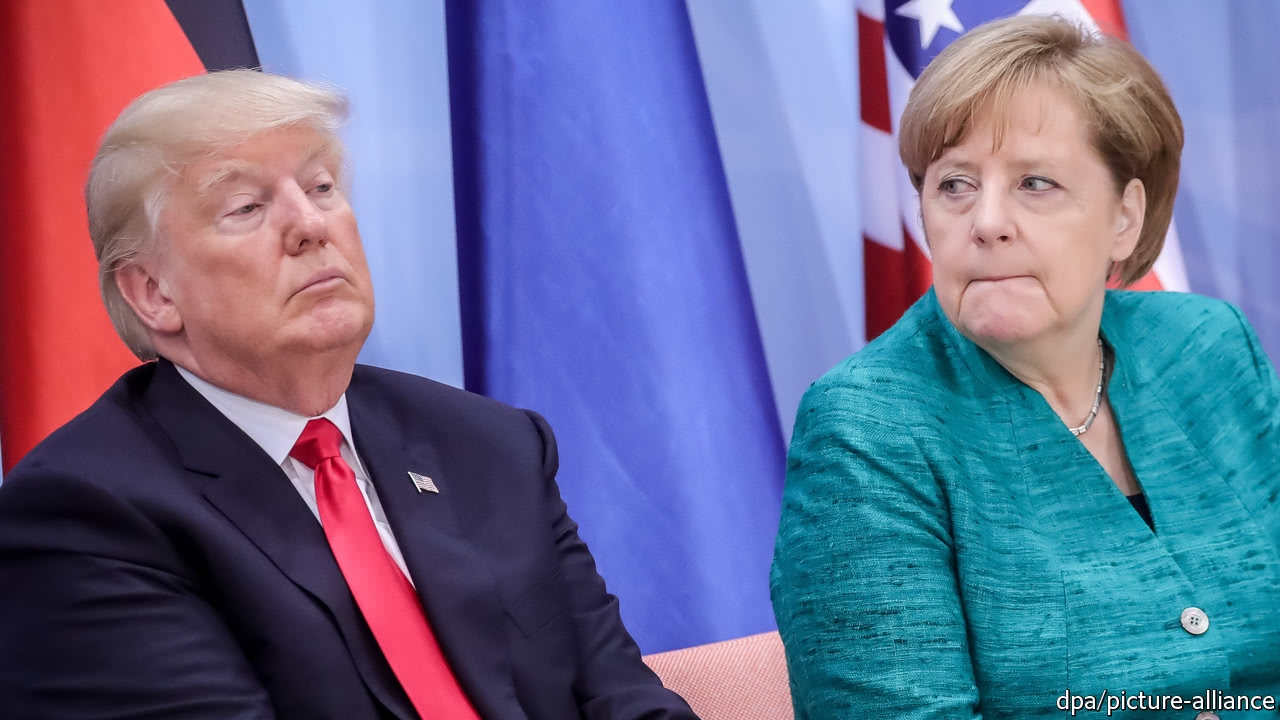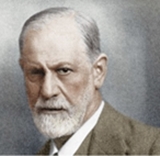The Ecomomist: Germany fears Donald Trump will divide Europe
Page 1 of 1
 The Ecomomist: Germany fears Donald Trump will divide Europe
The Ecomomist: Germany fears Donald Trump will divide Europe
Germany fears Donald Trump will divide Europe
Angela Merkel is troubled by the president’s chumminess with Putin and Poland

IN THE aftermath of the G20 summit on July 7th and 8th, German politicians traded blows over who was at fault for riots by anti-globalisation activists that smashed up parts of central Hamburg. But a big global event in the heart of a city with a strong anarchist tradition was always bound to prompt protests. Officials’ deeper reasons for anxiety were different: Donald Trump and his attitudes towards Russia and Poland.
To some in Berlin, the president’s meeting with Vladimir Putin was a “Yalta 2.0”, a 21st-century equivalent of the summit in 1945 at which Americans and Russians divided Europe. Angela Merkel saw Mr Trump’s “back-slapping and face-pulling” display before the Russian president (as the Frankfurter Allgemeine Zeitung, a daily, put it) as undermining her efforts to confront Russia over Ukraine. An internal memo by the German foreign ministry summarising the G20 noted: “The summit went very well for Russia…As long as the US breaks rank, Russia can swim in the mainstream.”
All of this plays into Mrs Merkel’s fears that the multilateral order that has served her country so well is under threat. “Others were isolated—an experience that Putin visibly enjoyed,” reported the memo. It also observed disconcertedly that conservative Russian think-tankers like Andrey Kortunov and Fyodor Lukyanov viewed the summit as a “rebalancing” in global relations: from the old battle between developed and developing economies to a new one between globalists and nationalists.
Still, Berlin had largely priced in a rapprochement between Messrs Trump and Putin. A more unsettling development was Mr Trump’s visit to Warsaw before the G20, where the president’s speech echoed the ideologies both of Mr Putin and of Poland’s populist-nationalist Law and Justice government. The foreign-ministry memo described this as an “astonishing tectonic shift” in American foreign policy.

Most striking of all was Mr Trump’s venue: a summit of the Three Seas Initiative. Launched by Poland and Croatia, this new central European project recalls the “Intermarium” proposed by Jozef Pilsudski, the father of the country’s second republic, which lasted from 1918-39. Pilsudski dreamed of allying states on the Baltic, Black and Adriatic seas to oppose domination either by Russians or Germans. Warsaw presents its revival as a bid to improve north-south transport and energy links in the region, to complement better-developed east-west ones (see map). But Berlin suspects something more hostile.
Consider the backdrop. Germany is already concerned about China’s “16+1” initiative with central and eastern European states, a series of investment projects that the Chinese expect will build influence in the region. The Germans are also putting pressure on the Polish government over its illiberal attacks on independent newspapers, judges and NGOs. And they are fending off Polish criticisms that their proposed “Nord Stream 2” gas pipeline from Russia to Germany will make Europe more dependent on Russia.
So Mr Trump could hardly have done more to aggravate German officialdom. He endorsed the Three Seas Initiative. In meetings with the Polish and Croatian presidents he guaranteed a supply of American liquefied natural gas (LNG) and backed a corridor linking LNG pipelines in the two countries. Poland opened its first terminal on the Baltic sea at Swinoujscie in 2015, and the first American cargo arrived there last month. In Warsaw, Mr Trump encouraged the rapid completion of a Croatian LNG terminal at Krk, on the Adriatic.
Though sensible, this looks to officials in Berlin like a bid to divide Europe and weaken Germany’s leverage over its neighbours. They are contemplating responses. One would be a new European infrastructure fund, to test whether Poland and its allies merely want more foreign investment or whether the Three Seas Initiative is actually about geopolitical balancing.
In years past, Germans developed a vision of a cohesive EU run from Brussels, steered mostly by Germany and underwritten by American power. Now they fear a future in which strongmen in Washington, Moscow and Beijing divide Europe and push around the pieces. Germany led the G20 meeting confidently, but it feels increasingly insecure.
This article appeared in the Europe section of the print edition under the headline "Teutonic tremors"
Angela Merkel is troubled by the president’s chumminess with Putin and Poland

IN THE aftermath of the G20 summit on July 7th and 8th, German politicians traded blows over who was at fault for riots by anti-globalisation activists that smashed up parts of central Hamburg. But a big global event in the heart of a city with a strong anarchist tradition was always bound to prompt protests. Officials’ deeper reasons for anxiety were different: Donald Trump and his attitudes towards Russia and Poland.
To some in Berlin, the president’s meeting with Vladimir Putin was a “Yalta 2.0”, a 21st-century equivalent of the summit in 1945 at which Americans and Russians divided Europe. Angela Merkel saw Mr Trump’s “back-slapping and face-pulling” display before the Russian president (as the Frankfurter Allgemeine Zeitung, a daily, put it) as undermining her efforts to confront Russia over Ukraine. An internal memo by the German foreign ministry summarising the G20 noted: “The summit went very well for Russia…As long as the US breaks rank, Russia can swim in the mainstream.”
All of this plays into Mrs Merkel’s fears that the multilateral order that has served her country so well is under threat. “Others were isolated—an experience that Putin visibly enjoyed,” reported the memo. It also observed disconcertedly that conservative Russian think-tankers like Andrey Kortunov and Fyodor Lukyanov viewed the summit as a “rebalancing” in global relations: from the old battle between developed and developing economies to a new one between globalists and nationalists.
Still, Berlin had largely priced in a rapprochement between Messrs Trump and Putin. A more unsettling development was Mr Trump’s visit to Warsaw before the G20, where the president’s speech echoed the ideologies both of Mr Putin and of Poland’s populist-nationalist Law and Justice government. The foreign-ministry memo described this as an “astonishing tectonic shift” in American foreign policy.

Most striking of all was Mr Trump’s venue: a summit of the Three Seas Initiative. Launched by Poland and Croatia, this new central European project recalls the “Intermarium” proposed by Jozef Pilsudski, the father of the country’s second republic, which lasted from 1918-39. Pilsudski dreamed of allying states on the Baltic, Black and Adriatic seas to oppose domination either by Russians or Germans. Warsaw presents its revival as a bid to improve north-south transport and energy links in the region, to complement better-developed east-west ones (see map). But Berlin suspects something more hostile.
Consider the backdrop. Germany is already concerned about China’s “16+1” initiative with central and eastern European states, a series of investment projects that the Chinese expect will build influence in the region. The Germans are also putting pressure on the Polish government over its illiberal attacks on independent newspapers, judges and NGOs. And they are fending off Polish criticisms that their proposed “Nord Stream 2” gas pipeline from Russia to Germany will make Europe more dependent on Russia.
So Mr Trump could hardly have done more to aggravate German officialdom. He endorsed the Three Seas Initiative. In meetings with the Polish and Croatian presidents he guaranteed a supply of American liquefied natural gas (LNG) and backed a corridor linking LNG pipelines in the two countries. Poland opened its first terminal on the Baltic sea at Swinoujscie in 2015, and the first American cargo arrived there last month. In Warsaw, Mr Trump encouraged the rapid completion of a Croatian LNG terminal at Krk, on the Adriatic.
Though sensible, this looks to officials in Berlin like a bid to divide Europe and weaken Germany’s leverage over its neighbours. They are contemplating responses. One would be a new European infrastructure fund, to test whether Poland and its allies merely want more foreign investment or whether the Three Seas Initiative is actually about geopolitical balancing.
In years past, Germans developed a vision of a cohesive EU run from Brussels, steered mostly by Germany and underwritten by American power. Now they fear a future in which strongmen in Washington, Moscow and Beijing divide Europe and push around the pieces. Germany led the G20 meeting confidently, but it feels increasingly insecure.
This article appeared in the Europe section of the print edition under the headline "Teutonic tremors"
Last edited by Eroo on 20/7/2017, 17:45; edited 1 time in total

Eroo- Posts : 79081
2016-07-22
 Re: The Ecomomist: Germany fears Donald Trump will divide Europe
Re: The Ecomomist: Germany fears Donald Trump will divide Europe
Klin se klinom izbija. 

_________________
Nulla rosa sine spina

Eroo- Posts : 79081
2016-07-22
 Re: The Ecomomist: Germany fears Donald Trump will divide Europe
Re: The Ecomomist: Germany fears Donald Trump will divide Europe
Ide sjeverni tok, hoćemo nruski plin.....bez istočnoeuropskih prznica i zanovijetala :)

epikur37- Posts : 45339
2015-08-06

gargamel0101- Posts : 3558
2015-07-23
 Re: The Ecomomist: Germany fears Donald Trump will divide Europe
Re: The Ecomomist: Germany fears Donald Trump will divide Europe
Pa ko van brani, ali mimo "Uspravnice"...Imate tamo (i) Turski tok pa dišite, pušite ili šta već...epikur37 wrote:Ide sjeverni tok, hoćemo nruski plin.....bez istočnoeuropskih prznica i zanovijetala :)

Last edited by Eroo on 20/7/2017, 17:51; edited 1 time in total

Eroo- Posts : 79081
2016-07-22
 Re: The Ecomomist: Germany fears Donald Trump will divide Europe
Re: The Ecomomist: Germany fears Donald Trump will divide Europe
Gagi kaj ti je to na aviću?

epikur37- Posts : 45339
2015-08-06
 Re: The Ecomomist: Germany fears Donald Trump will divide Europe
Re: The Ecomomist: Germany fears Donald Trump will divide Europe
Obzirom da je ruski plin jeftiniji i kvalitetniji u što ćemo prenamijeniti LNG.
Umjetni otok, akvarij...polupodmornicu?
Umjetni otok, akvarij...polupodmornicu?

epikur37- Posts : 45339
2015-08-06
 Re: The Ecomomist: Germany fears Donald Trump will divide Europe
Re: The Ecomomist: Germany fears Donald Trump will divide Europe
epikur37 wrote:Obzirom da je ruski plin jeftiniji i kvalitetniji u što ćemo prenamijeniti LNG.
Umjetni otok, akvarij...polupodmornicu?
što se nas u Istri tiče mi plina imamo direktno sa izvora nama ne treba ni ruski ni američki plin čak štoviše još ga i vama dajemo. cijela Istra je plinificirana zemnim plinom tako da smo vas preskočili za 50-tak godina...
Transportni plinovodni sustav u Istarskoj županiji sačinjavaju dva magistralna plinovoda koji po svom obliku tvore slovo “V“, jer svojim koridorima na neki način prate istočnu i zapadnu obalu:
Plinovod Ivana – Pula – Karlovac: povezuje sjevernojadranska nalazišta plina s kontinentalnim visokotlačnim sustavom i svojim koridorom prati istočnu obalu. Dimenzija cijevi je DN 700, radni tlak 75 bara, a godišnji kapacitet 1,5 mlrd.m³. Duljina kopnenog djela plinovoda iznosi 191 km (trasa u Istarskoj županiji 54,6km). Na području Istarske županije pored Terminala Pula koji je lociran blizu Vodnjana, postoje još dvije mjerno-redukcijske stanice: MRS Labin i MRS Kršan. U mjerno-redukcijskim stanicama se plin reducira na srednji ili niski tlak i predaje distribucijskim plinovodima. Grad Pula i okolna naselja (Vodnjan, Fažana, Medulin i Ližnjan) opskrbljivat će se plinom iz Terminala Pula.
Plinovod Vodnjan – Umag: kreće iz Terminala Pula i završava u Umagu (Industrijska zona Ungarija) i u svom koridoru prati zapadnu obalu. Dimenzija cijevi je DN 300, radni tlak 50 bara, a godišnji kapacitet 300 mln.m³, a duljina plinovoda 71 km. Plinovod ima četiri mjerno-redukcijske stanice: MRS Rovinj ( za opskrbu Rovinja, Bala), MRS Poreč (za opskrbu Poreča, Funtane, Vrsara i Tara), MRS Kovri ( za opskrbu Novigrada, Brtonigle i Buja) i MRS Umag (za opskrbu Umaga).
Transportni sustav je u vlasništvu tvrtke Plinacro koja i upravlja njime. Njime se transportira plin na veće udaljenosti, a služi da preuzeti plin (od nalazišta ili nekog drugog izvora) transportira do distributera.


Guest- Guest
 Re: The Ecomomist: Germany fears Donald Trump will divide Europe
Re: The Ecomomist: Germany fears Donald Trump will divide Europe
https://en.wikipedia.org/wiki/Jean-Bédel_Bokassaepikur37 wrote:Gagi kaj ti je to na aviću?
Many people in the Central African Republic, and most of the rest of the world, regard Bokassa as a typical kleptocrat or describe him as either an egotistical madman or a bloodthirsty dictator. In 2010, President François Bozizé issued a decree rehabilitating Bokassa and calling him "a son of the nation recognised by all as a great builder".[57] The decree went on to hold that "This rehabilitation of rights erases penal condemnations, particularly fines and legal costs, and stops any future incapacities that result from them".[57] In the lead-up to this official rehabilitation, Bokassa has been praised by CAR politicians for his patriotism and for the periods of stability that he brought the country.

gargamel0101- Posts : 3558
2015-07-23

crvenkasti-

Posts : 29734
2014-04-17
 Re: The Ecomomist: Germany fears Donald Trump will divide Europe
Re: The Ecomomist: Germany fears Donald Trump will divide Europe
togedr vi stend,junajted vi fol 

My Brother Billo- Posts : 2237
2017-04-17
 Re: The Ecomomist: Germany fears Donald Trump will divide Europe
Re: The Ecomomist: Germany fears Donald Trump will divide Europe
čuo sam, mančester junajted
jel to?
jel to?

crvenkasti-

Posts : 29734
2014-04-17

My Brother Billo- Posts : 2237
2017-04-17
 Re: The Ecomomist: Germany fears Donald Trump will divide Europe
Re: The Ecomomist: Germany fears Donald Trump will divide Europe
Mogu vam ga dostavit po sistemu zaprašivanja. Zovi UTVA-u.epikur37 wrote:Obzirom da je ruski plin jeftiniji i kvalitetniji u što ćemo prenamijeniti LNG.
Umjetni otok, akvarij...polupodmornicu?


Eroo- Posts : 79081
2016-07-22
 Re: The Ecomomist: Germany fears Donald Trump will divide Europe
Re: The Ecomomist: Germany fears Donald Trump will divide Europe
s tim u vezi i napadi na predsjednicu:
Inicijativa tri mora štetna je za Hrvatsku, a Kolinda Grabar-Kitarović povezana je s američkim lobijem koji radi protiv Europe – najoštrija je kritika hrvatskoj predsjednici otkad je na Pantovčaku, a uputio ju je IDS-ovac Ivan Jakovčić.
Istovremeno, The Economist u velikom tekstu tvrdi da je Njemačka zabrinuta zbog poljsko-hrvatske inicijative. Ugledni list tvrdi da dužnosnicima u Berlinu, pa tako i moćnoj kancelarki Angeli Merkel, inicijativa izgleda kao pokušaj podjele Europe i slabljenja utjecaja Njemačke na susjede, piše jutarnji.hr
Razmatra se i odgovor u obliku novog europskog infrastrukturnog fonda kako bi se vidjelo jesu li Poljska i njezini saveznici (tu se misli i na Hrvatsku ?) zainteresirani za ulaganja ili je Inicijativa tri mora ipak jedna vrsta geopolitičkog balansiranja.
– Čini se da je posve obrnuto od onoga što tvrdi Ivan Jakovčić, jer ova Inicijativa radi upravo na jačanju kohezije članica Europske unije. Time se na neki način žele ukloniti i razlike koje vladaju između ‘starih’ i ‘novih’ članica, a treba znati i da je riječ o neformalnoj inicijativi kojoj sigurno nije cilj slabiti EU, nego je jačati – govore izvori bliski hrvatskoj predsjednici.
Nakon skupa u Varšavi ni Njemačka, ni bilo koja druga europska država nije imala prigovor za Hrvatsku, iako su na Pantovčaku svjesni da je bilo nepovjerenja prema Poljskoj. Njemačka diplomacija prepoznala je interese Hrvatske koji su usmjereni prije svega na jačanje kohezije u srednjoj Europi i realizaciju projekata za koje je zainteresiran i EU.
– Svi ozbiljni ljudi i međunarodna javnost prepoznali su naša stajališta i s tim nije bilo nikakvih problema – rekli su nam predsjedničini suradnici, a Ivan Jakovčić u razgovoru za Glas Istre tvrdi da ga kolege u Europskom parlamentu pitaju kamo to ide hrvatska vanjska politika.
> Inicijativa tri mora: Hrvatska u čak 27 projekata vrijednih oko 4,4 milijarde eura
– To je apsurd, jer u okviru Inicijative djeluje dvanaest zemalja članica EU. Kad se u troje nađu Angela Merkel, Emmanuel Macron i talijanski premijer Paolo Gentiloni i razgovaraju o izbjeglicama, onda to nije problem, a navodno bi trebao biti problem kad dvanaest zemalja EU želi jačati koheziju srednje Europe. A sama predsjednica je više puta istaknula da Inicijativa nije usmjerena ni protiv Njemačke, ni protiv Rusije, niti da je riječ o američkom trojanskom konju – kažu na Pantovčaku.
https://narod.hr/eu/karte-se-otvaraju-merkel-jakovcica-brine-inicijativa-tri-mora
Inicijativa tri mora štetna je za Hrvatsku, a Kolinda Grabar-Kitarović povezana je s američkim lobijem koji radi protiv Europe – najoštrija je kritika hrvatskoj predsjednici otkad je na Pantovčaku, a uputio ju je IDS-ovac Ivan Jakovčić.
Istovremeno, The Economist u velikom tekstu tvrdi da je Njemačka zabrinuta zbog poljsko-hrvatske inicijative. Ugledni list tvrdi da dužnosnicima u Berlinu, pa tako i moćnoj kancelarki Angeli Merkel, inicijativa izgleda kao pokušaj podjele Europe i slabljenja utjecaja Njemačke na susjede, piše jutarnji.hr
Razmatra se i odgovor u obliku novog europskog infrastrukturnog fonda kako bi se vidjelo jesu li Poljska i njezini saveznici (tu se misli i na Hrvatsku ?) zainteresirani za ulaganja ili je Inicijativa tri mora ipak jedna vrsta geopolitičkog balansiranja.
– Čini se da je posve obrnuto od onoga što tvrdi Ivan Jakovčić, jer ova Inicijativa radi upravo na jačanju kohezije članica Europske unije. Time se na neki način žele ukloniti i razlike koje vladaju između ‘starih’ i ‘novih’ članica, a treba znati i da je riječ o neformalnoj inicijativi kojoj sigurno nije cilj slabiti EU, nego je jačati – govore izvori bliski hrvatskoj predsjednici.
Nakon skupa u Varšavi ni Njemačka, ni bilo koja druga europska država nije imala prigovor za Hrvatsku, iako su na Pantovčaku svjesni da je bilo nepovjerenja prema Poljskoj. Njemačka diplomacija prepoznala je interese Hrvatske koji su usmjereni prije svega na jačanje kohezije u srednjoj Europi i realizaciju projekata za koje je zainteresiran i EU.
– Svi ozbiljni ljudi i međunarodna javnost prepoznali su naša stajališta i s tim nije bilo nikakvih problema – rekli su nam predsjedničini suradnici, a Ivan Jakovčić u razgovoru za Glas Istre tvrdi da ga kolege u Europskom parlamentu pitaju kamo to ide hrvatska vanjska politika.
> Inicijativa tri mora: Hrvatska u čak 27 projekata vrijednih oko 4,4 milijarde eura
– To je apsurd, jer u okviru Inicijative djeluje dvanaest zemalja članica EU. Kad se u troje nađu Angela Merkel, Emmanuel Macron i talijanski premijer Paolo Gentiloni i razgovaraju o izbjeglicama, onda to nije problem, a navodno bi trebao biti problem kad dvanaest zemalja EU želi jačati koheziju srednje Europe. A sama predsjednica je više puta istaknula da Inicijativa nije usmjerena ni protiv Njemačke, ni protiv Rusije, niti da je riječ o američkom trojanskom konju – kažu na Pantovčaku.
https://narod.hr/eu/karte-se-otvaraju-merkel-jakovcica-brine-inicijativa-tri-mora

Guest- Guest
 Re: The Ecomomist: Germany fears Donald Trump will divide Europe
Re: The Ecomomist: Germany fears Donald Trump will divide Europe
Merkelici nije atraktivna i interesantna situacija gdje dojčland nije na čelu čopora.....

orion- Posts : 2287
2017-06-06
 Re: The Ecomomist: Germany fears Donald Trump will divide Europe
Re: The Ecomomist: Germany fears Donald Trump will divide Europe
orion wrote:Merkelici nije atraktivna i interesantna situacija gdje dojčland nije na čelu čopora.....
čini mi se da je i plenković na tom tragu

Guest- Guest
 Re: The Ecomomist: Germany fears Donald Trump will divide Europe
Re: The Ecomomist: Germany fears Donald Trump will divide Europe
Precjednica je pak na tragu americke hegemonije.

epikur37- Posts : 45339
2015-08-06
 Re: The Ecomomist: Germany fears Donald Trump will divide Europe
Re: The Ecomomist: Germany fears Donald Trump will divide Europe
kakav se disbalans dogodio na vrhu vrhova - jako sam zabrinuta 


orion- Posts : 2287
2017-06-06
 Similar topics
Similar topics» Back off, Trump. Germany wants to Make Europe Strong Again
» Donald Trump - inauguracija
» Donald Trump je prijevara?
» Donald Trump: ‘I Disavow’ Alt-Right Groups
» Donald Trump: Ponovite izbore!
» Donald Trump - inauguracija
» Donald Trump je prijevara?
» Donald Trump: ‘I Disavow’ Alt-Right Groups
» Donald Trump: Ponovite izbore!
Page 1 of 1
Permissions in this forum:
You cannot reply to topics in this forum
 Events
Events Latest images
Latest images
 by Eroo 20/7/2017, 17:41
by Eroo 20/7/2017, 17:41